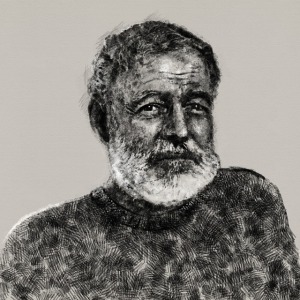This is a post about something that about 98% of people in the arts have bad memories about.
A Conversation at a Party.
The cases Of Ernest Hemingway, Jack London, And Henry Miller
I was talking to a woman at a party. It was a nice party and the woman–a well-known painter from the Midwest–was good company–cheerful, friendly. Our conversation turned to the arts, as my conversations—and hers–often do, and we talked of this and that. And then, knowing I was a writer and poet, she asked me, “Did you ever not get published because you lacked the credential of previous publications?”
I said “Yes, when I was starting out, which is of course the worst possible time for a writer, the time of greatest vulnerability. I think everyone in the arts has been stymied by the particular problem of credentials.”
She said, “I certainly have.”
I said, “Funny isn’t it, you’re so famous.”
“But that wasn’t always the case. It was a long time before anyone knew I was a good saleable painter.”
I said, “It makes me think of all the great writers who had trouble getting published for that reason. I  think of my favorite writer, Ernest Hemingway, and ask myself, ‘How could an editor with any judgment at all reading young Hemingway’s beautiful prose say, ‘We can’t publish you because no one knows who you are.’ Hemingway would often cry as he received still another rejection slip. Yet he persevered submitting stories and in not many years he would be recognized as the best writer in the world, and in a few more years he would be the most famous and the most highly paid. The same happened to Jack London–unable to be published, hundreds of rejections, a publication, then within a year the most popular writer in the world.“
think of my favorite writer, Ernest Hemingway, and ask myself, ‘How could an editor with any judgment at all reading young Hemingway’s beautiful prose say, ‘We can’t publish you because no one knows who you are.’ Hemingway would often cry as he received still another rejection slip. Yet he persevered submitting stories and in not many years he would be recognized as the best writer in the world, and in a few more years he would be the most famous and the most highly paid. The same happened to Jack London–unable to be published, hundreds of rejections, a publication, then within a year the most popular writer in the world.“
Henry Miller was angry with editors who rejected him because literarily he was a nobody. He was living in poverty, his only possessions the clothes he was wearing and a comb. Editors abused him mercilessly. He wrote in a letter to a friend,” Who do these shits think they are to say such things to me?”
“The Matthew Effect”
You may not like it, but unless you write or paint or act solely for the joy of it (as many people do) and have no interest in going any further in the Darwinian survival-of-the fittest, ferociously-competitive modern world of the arts, you have to compete for attention. Opportunities in the arts are limited, yet there are millions of Americans who claim to be “in the arts.” They are trying to get their story rather than yours in the magazine, or their book released by the publisher rather than yours, or get their painting rather than yours in the show, or get the lead in Macbeth.
All any person in the arts asks for is a level playing field. But the playing field is not level. The concept of “The Matthew Effect” derives from the Bible’s book of Matthew (25, 29): “For unto everyone that hath shall be given, and he shall have abundance: but from him that hath not shall be taken away even that which he hath.” That refers in writing and painting (and all the other arts and all the sciences and in all of academia) to the rich get richer, the fact that more status is given to the most highly recognizable people in the field (though they might not be the most deserving), while recognition is withheld from writers, painters etc., who aren’t well-known (though they might be the most deserving).
 What unpublished author hasn’t had the depressing experience of reading crappy books by writers who have published fifteen other books just as crappy and thought, “I’m better than they are, so how does such a thing happen? Is there no justice?” It’s “The Matthew Effect” in operation—they hath and you hath not. The artist who hasn’t been recognized yet must understand and overcome “The Matthew Effect” to now become recognized—to become one who hath.
What unpublished author hasn’t had the depressing experience of reading crappy books by writers who have published fifteen other books just as crappy and thought, “I’m better than they are, so how does such a thing happen? Is there no justice?” It’s “The Matthew Effect” in operation—they hath and you hath not. The artist who hasn’t been recognized yet must understand and overcome “The Matthew Effect” to now become recognized—to become one who hath.
© 2024 David J. Rogers
For my interview from the international teleconference with Ben Dean about Fighting to Win, click the following link:
Order Fighting to Win: Samurai Techniques for Your Work and Life eBook by David J. Rogers
or
Order Waging Business Warfare: Lessons From the Military Masters in Achieving Competitive Superiority
or


I have heard this voiced by so many now-famous writers. I am reminded of John Grisham’s sharing that when The Firm was published he traveled all over with a car trunk full of copies that he couldn’t even give away.
LikeLike
Some writers can become embittered by the experience, but what good does that do? Your comment reminds me of Henry David Thoreau who sold only a few copies of one of his books–i forget which one. When he was asked how many books he had in his library, he said, “Five hundred–of my own.”
LikeLiked by 1 person
An editor friend/mentor who worked for Hachette in Australia said, on reading the first few chapters of my memoir, that it would be hard to find a home because both I and the subject (an ancestor) were unknown. She wasn’t being unkind, just realistic, and things turned out exactly the way she said. I’m thankful that I have more than one comb and several changes of clothing to my name.
LikeLike
I think the editor’s reaction, unfortunately, is pretty typical. But I like your attitude. With an attitude like that, you’ll overcome many setbacks of the literary life. Thanks for the comment. It’s always a pleasure to hear from you.
LikeLiked by 1 person